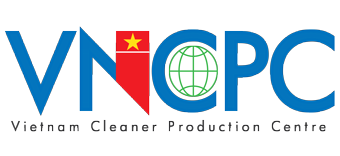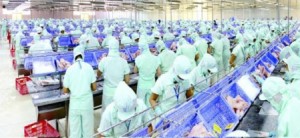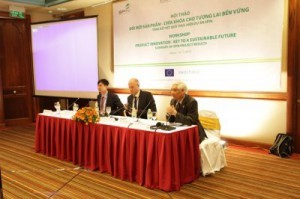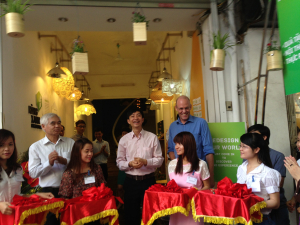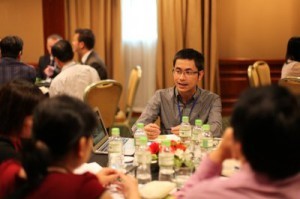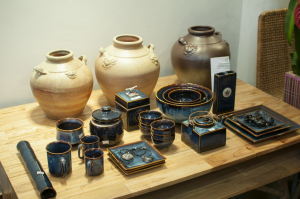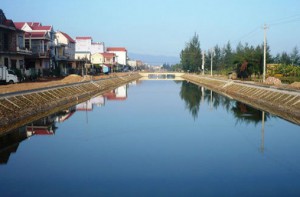SUPA Study-chapter I: Sustainable pangasius market potential in Europe
Chapter I – European Seafood Market Summary and Recommendations – Feedback from the retailer interviews overwhelmingly stated that while both retailers and customers were not willing to pay more for certification, they were willing to pay more for quality. This did not mean that certification was any less important in reducing risk or building brand credibility. Explore how responsible practices at the farm and processing level contribute to improved quality.
Introduction:
The objective of the SUPA market analysis project was threefold: to gain insights into the European market perceptions of the Pangasius industry in Vietnam; conduct an analysis of key market players and trends in the European market and based upon this information generate recommendations for improving the image of Pangasius from Vietnam to increase either the volume sold or value per unit in Europe.
The image of Pangasius in Europe:
The image of Pangasius in Europe among retailers has been impacted by negative media reports and the campaigns waged by competitive interests in individual markets. In general, the Pangasius industry is viewed as massive, production driven and resulting in negative impacts.
The European market, key players and trends:
The European market will grow from a 2010 population base of 501,044,066 to a forecasted 522,342,413 in 2030.1 This growth is approximately equal to the addition of 2 countries with the same population as Belgium and Greece (using 2010 population figures). At the same time, per-capita consumption of fish will increase 2 kg from 22kg to 24 kg per-capita.2 Against this backdrop is the fact that Europe is highly dependent on imports to meet demand and will continue to depend on fish and seafood imports into the foreseeable future.
The European retail market is highly consolidated and constitutes the overwhelming majority of the top 25 retailers globally.

The primary markets for Pangasius in Europe are in descending order: Spain; the Netherlands; Germany and the United Kingdom. Desktop research revealed through CSR initiatives and seafood sourcing policies, European retailers have choice-editing agendas in place. Choice-editing entails the limiting of products offered to customers based on environmental, social and/or other considerations. The effect of choice-editing with aquaculture products (and Pangasius in particular) varies by country and retailer.
Spain, Germany, France and the United Kingdom provide attractive markets for (re) development of Pangasius sales. “Whitefish” sales (including Pangasius) in Spain have suffered due to the financial crisis and therefore should increase with an economic rebound. Spain is also attractive due to its trade with Portugal. A television documentary aired in Germany in 2011 directly impacted Pangasius sales in Germany, Austria and Switzerland. Since then Germany has experienced strong uptake of the ASC label, to help rebuild consumer trust.
France has also experienced a decline in Pangasius sales due to negative media reports, but as the largest consumer of fish and seafood in Europe is a key market. Finally, in the United Kingdom certified Pangasius is beginning to gain market recognition. All of these markets hold promise for increased Pangasius sales based on an improved image.
For Pangasius from Vietnam, European retailer purchasing decisions are predominantly influenced by the following considerations: quality, price and service; food safety; social considerations; environmental impacts; animal health and welfare and traceability. Each one of these determinants help to reduce the retailer reputational risk associated with products. Quality, food safety or other product issues such as social considerations, environmental impact or animal health and welfare are often addressed through certification platforms and schemes. In the case of quality an example would be the “Label Rouge” label in France. Food safety is addressed through the Global Food Safety Initiative platform. Other considerations are addressed through aquaculture certification schemes such as: the ASC; GlobalG.A.P.; the Global Aquaculture Alliance BAP program; Friend of the Sea and organic schemes.
Promoting and protecting an individual retail and supplier brand identity is extremely important in highly consolidated markets such as the European marketplace. Retailers and their suppliers have developed campaigns to message the integrity of their brands to reduce risk. Examples include:
– Marks and Spencer’s Plan A “Forever Fish” campaign in conjunction with the Marine Conservation Society and WWF (UK)
– The Young’s (and Findus) “Fish for Life” campaign (UK headquartered)
– Iglo Foods “Forever Food” campaign (UK headquartered)
– The Edeka partnership with WWF for sustainable fisheries (Germany)
Additionally, other programs are used to strengthen retailer brand identity at the product level through signage and labels:
– In the UK: ASDA’s low price guarantee
– In Germany: Edeka’s use of the ASC label
– In Spain Auchan’s “Producción Controlada” label
– In the Netherlands: the use of a stoplight system at Plus
– And in France: Carrefour’s label stating the product was raised on feed free of GMO ingredients (<0.9%).
Here the ultimate objective is to enhance product credibility. And while study results vary, market feedback is clear…consumers are confused by multitude of product labels. Thus this research identified a growing trend to focus on first on building brand reputation through easily understood consumer messaging e.g. price and/or quality and where necessary or applicable enhance the brand reputation through product credibility messaging with either internal labels or external labels.
What about the image of Pangasius products from Vietnam? First, for Pangasius from Vietnam there is good news in European market. Pangasius from Vietnam has a strong presence in the European retail marketplace. Additionally, Pangasius from Vietnam is perceived as: affordable; mild flavored; boned; and easy to prepare. Pangasius from Vietnam also has reputational problems associated with quality, food safety, social and environmental concerns as well as animal health and welfare. Addressing these issues is important because they determine the degree of market access in Europe.
In recent years a great deal of effort has been put into acquiring various certifications to improve the image of Pangasius and enhance its reputation, but is it as simple as “ticking the box”? It is important to understand that aquaculture certification schemes do not guarantee market access. They are simply a tool to facilitate market access. Secondly, certification schemes are not a guarantee of a premium at the farm, processor or retail level. This is especially true in the highly competitive European national markets (France, the United Kingdom and Germany). Thus aquaculture certification needs to be integrated into an overarching market approach to build a new image of certified Pangasius in the European marketplace as a quality source of protein which enhances brand and product credibility.
To improve the image of Pangasius from Vietnam in the European market the following recommendations are made:
– Choice-edit or be choice-edited – Understand how farm and processing practices are perceived by European retailers. This requires constant monitoring of retailer policies and key issues driving those policies.
– Recognize the economy influences, but does not determine the fate of the Pangasius industry in Europe. If Pangasius is truly a price driven product in Europe, sales should increase during economic downturns.
– Identify how Pangasius can reduce retailer risk and increase brand credibility and branded product credibility.
– Identify a balance between production driven agendas and marketing agendas for Pangasius.
– Be proactive on issues such as GMO free feed ingredients and animal welfare.
– Communicate positive news – feedback from retailer interviews included a need for communication advancements at the farm and processing level. “Pangasius has a poor reputation, perhaps unfairly so”, said one retailer. Another retailer stated, “much has changed in the last 3 years, where is the positive news?”
Final recommendation:
Feedback from the retailer interviews overwhelmingly stated that while both retailers and customers were not willing to pay more for certification, they were willing to pay more for quality. This did not mean that certification was any less important in reducing risk or building brand credibility. Explore how responsible practices at the farm and processing level contribute to improved quality.
SUPA Study on market potential of sustainably produced Pangasius in Europe
Project: Establishing a Sustainable Pangasius Supply Chain in Vietnam
Author: Carson Roper, Independent Consultant
Contracted by: WWF Austria
Source: pangasius-vietnam.com
